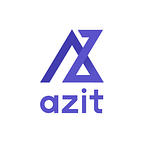Looking into DEX
‘azit’ is a blockchain-based, point integration platform for real estate and residential services. ‘azit’ provides a service that allows users to conveniently use points as they see fit for residential services related to real estate or community facilities by integrating points that can be used anywhere.
Welcome to ‘azit’!
In 2021, a lot of blockchain topics like DEX, DeFi, NFT, WEB 3.0 were the talk of hodlers. Among these topics, we would definitely want to talk about DEX, which recorded over 1 trillion dollars in trade volume and 858% growth compared to 2020.
DEX — Decentralized Exchange
DEX is a decentralized crypto exchange market different from CEX (Centralized Exchange) using P2P (Peer to peer) method. There is a basic premise that users participating in the transaction can control their digital assets and personal keys without a control tower. DEX is a platform with an automated protocol that helps buy and sell trades without any centralized organizations interfering.
How does DEX work?
DEX relies on smart contracts in order to maintain decentralization and calculates the crypto price by algorithm. There are 3 typical types of DEX based on these characteristics.
On-chain
- On-chain means every order and transaction is recorded on the chain.
- Requiring many nodes, seems un-efficient because most of the work can’t be processed in real-time
Off-chain
- In this case, transaction recording is done on the chain, making it possible for a 3rd party to participate, which means DEX is not perfectly decentralized
- Some experts explain as a hybrid, due to the nature of central focused and distributed trading mechanism combined.
AMM
- Automated Market Maker helps traders when they want to buy or sell an asset by automatically changing the price based on a preset algorithm.
- TOP DEXs based on TVL such as Uniswap, MakerDAO etc. are most likely to use AMM
- Crypto hodlers prefer direct, transparent, and fast transactions, and AMM is a matching fit for that needs.
Pros
- Diversity: If there is a demand and supply for an unlisted crypto coin, DEX might be the right place to list first
- Security: Transactions are made wallet to wallet (P2P), meaning that theoretically hacking incidents that occur in centralized exchanges can be avoided.
- Anonymity: No need for KYC or any other identification, it stays anonymous.
Cons
- Unfriendly UI/UX: CEX provides many information and guides on how to use it properly. On the other hand, DEX needs some studying in advance to understand things like browser expanding, smart contracts, wallet setting etc. and most of the time the UI, UX is very unfriendly to users.
- Lack of trade volume and liquidity: Trade volume and liquidity is mostly determined by how many traders are in the market, and despite the fact that DEX supports diverse crypto assets, most DEXs (excluding top tier DEXs) have difficulty in maintaining enough trade volume and liquidity due to lack of users.
- Transaction Speed: Trading speed is relatively slower than CEX because DEX uses smart contracts. This is seen as a structural limit at the moment, CEX using a centralized server is way faster than DEX. There are various attempts to solve this matter, e.g., trading process on off-chain and recording on on-chain only when the deal is set.
Wrapping up
DEX is constantly evolving based on its high profit (compared to legacy exchanges), security (where users manage their own asset), anonymity (no need for KYC).
But there are still a lot of obstacles to conquer, problems like transaction speed, user experience, policy issues, total decentralization and so on.
